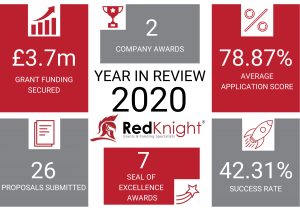£92 million funding boost for green technologies
 The UK Government has announced a £92 million funding boost for green technologies as part of the £1 billion Net Zero Innovation Portfolio. In the next year, they will launch three innovation challenges across key areas of the green energy sector. These include energy storage technology, floating offshore wind, and biomass production.
The UK Government has announced a £92 million funding boost for green technologies as part of the £1 billion Net Zero Innovation Portfolio. In the next year, they will launch three innovation challenges across key areas of the green energy sector. These include energy storage technology, floating offshore wind, and biomass production.
The development of these technologies will reduce costs of deployment across the energy sector. In addition, the green technologies will create highly skilled jobs across the UK and help grow the economy in the aftermath of Covid-19.
Following the announcement, Energy Minister Anne-Marie Trevelyan said:
“This funding will allow us to develop new ways of unlocking the potential for green energy as we continue making big strides towards our goal of eradicating our contribution to climate change by 2050.”
Energy storage innovation
Of the £92 million government investment, £68 million is allocated for the development of energy storage technologies to support a future renewable energy system. This competition will formally open to bids in the spring. However, you can express your interest now on the Government website.
Floating offshore wind
Secondly, the Government will invest £20 million in the advancement of floating offshore wind technology. Innovative projects in this area could advance vital components such as dynamic high voltage cable systems, moorings for challenging seabed conditions and foundations. You can lodge an expression of interest in the offshore wind competition now.
Sustainably sourced biomass
Thirdly, £4 million is available for projects that increase the production of sustainably sourced biomass in the UK. New innovations will help scale up sustainably sourced biomass feedstocks and the production of energy crops. As well as this, they will help to achieve improvements in yields, cost reductions and profitability.
The biomass feedstocks innovation competition is now open to applications. All applicants must register their interest by 31st March and submit their full application by 7th May. If you’re looking for bid writing support, please contact us to arrange a free consultation.
UK Government announces plans for ARIA: a high risk, high reward research agency
The UK government is set to launch an independent research agency to support the development of new technologies. The Advanced Research and Invention Agency (ARIA) will fund “high-risk, high-reward” research to secure the country’s position as a global science superpower.
While a launch date is not yet available, the Government expects ARIA to be fully operational by 2022. It will complement the work of the UK’s existing Research and Innovation body, UKRI, and build on the government’s R&D Roadmap. The agency will receive £800 million of government funding over the course of this Parliament.
How will it work?
ARIA will be independent of government and led by prominent, world-leading scientists. It will benefit from additional flexibility and speed, thanks to the simplification of R&D bureaucratic models. This will equip the agency to identify the most ambitious, cutting-edge areas of research and technology. In turn, these projects will lead to the creation of highly skilled jobs across the country.
Background
The UK has a long history of research and innovation. For example, Ada Lovelace and Alan Turing pioneered early predecessors of the computer, Thomas Newcomen and James Watt transformed travel by creating steam engines, and Frank Partridge helped save millions of lives by developing the first portable defibrillator. The UK government hopes that the creation of ARIA will continue this tradition.
The new agency is based on models that have proved successful in other countries, particularly the US Advanced Research Projects Agency (ARPA) model. ARPA has enabled the creation of several transformational technologies, including the internet and GPS. Additionally, ARPA’s successor, DARPA, was a vital pre-pandemic funder of mRNA vaccines and antibody therapies, leading to critical Covid-19 therapies.
Following the announcement, Government Chief Scientific Adviser, Sir Patrick Vallance said:
“The Advanced Research and Invention Agency will build on the UK’s world-class scientific research and innovation system. The importance of scientific innovation has never been clearer than over the last year and this new body provides an exciting new funding mechanism for pioneering R&D.”
We will provide further updates on ARIA as they become available. In the meantime, you can find relevant funding opportunities through UKRI’s Funding Finder. Alternatively, sign up for our free monthly newsletter to receive our pick of the latest competitions direct to your inbox.
Source: UK Government
Energy Entrepreneurs Fund: £11 million available
 A new round of the Energy Entrepreneurs Fund (EEF) is now open for applications. Energy entrepreneurs can apply for a share of £11 million to support the development of technologies, products and processes in the areas of energy efficiency, power generation and storage.
A new round of the Energy Entrepreneurs Fund (EEF) is now open for applications. Energy entrepreneurs can apply for a share of £11 million to support the development of technologies, products and processes in the areas of energy efficiency, power generation and storage.
What is available?
Funding is available for between 15 and 20 projects, with each successful bidder receiving up to £1 million. In particular, the grant funding scheme aims to assist start-ups and SMEs. Successful applicants will also receive Acceleration Support.
What is the EEF?
The EEF is part of the BEIS £1 billion Net Zero Innovation Portfolio. It has launched seven phases since it begun in 2012 and allocated a total of £72 million. Previous innovations include tech to anchor floating offshore wind turbines and the use of ash waste in glassmaking.
The competition presents an excellent opportunity for businesses throughout the whole of the UK. Secretary of State for Wales, Simon Hart, said:
“The chance to share in this funding is fantastic news for promising Welsh energy entrepreneurs. The UK government is committed to achieving net zero carbon by 2050. We will do so by investing in pioneering projects, people and businesses, creating green jobs and opportunities for people across Wales.”
You can find more information on the Energy Entrepreneurs Fund here. Please note that you must register your interest by 26th February and then submit your application by 30th March. If you’d like to discuss a potential project with one of our advisers, contact us today.
You may also be interested in the Industrial Energy Transformation Fund, which aims to help businesses with high energy use to cut their bills and emissions through investment in energy efficiency and low-carbon technologies. A new round will open on 8th March. Businesses can apply for a share of £40 million for feasibility and engineering studies, as well as deployment projects.
2020: A Year in Review
2020 – well, where do we begin? It’s been an eventful year for RedKnight and all of our clients, with the Covid-19 pandemic bringing challenges that none of us could have foreseen. We’ve spent the best part of the year working from home, more committed than ever to making innovation funding easier for start-ups and SMEs. It’s fair to say we lost count of all the Zoom meetings a long time ago!
Projects
While the year has had its challenges, it’s also brought highpoints that we as a business are extremely proud of. We've supported projects from a range of sectors, from digital health to advanced materials. In particular, we were proud to support the innovative medtech start-up, GeneFirst, with a successful application to Horizon 2020’s Innovative Medicine Initiative, winning €2.8 million. The competition was extremely competitive; of 144 applications, just 8 projects received funding. An impressive feat, considering RedKnight had just 14 days to develop and write the 70-page application! To read more about GeneFirst’s Rapid-Covid project, and the other successful projects we’ve supported this year, visit our website.
2020 in Numbers

It's been another busy year of bid writing, with 26 proposals submitted at the time of writing. We are proud to have secured a further £3.7 million in grant funding, bringing our total to almost £10 million! Our average application score now stands at 78%, with a success rate of over 42%.
Overall, 2020 has been a great year for RedKnight, and we look forward to taking on new challenges in 2021. We’d like to take the opportunity to say a huge thank you to all of our clients, both new and old, who’ve trusted us to support their proposals. We look forward to following your projects in 2021 and working with you again in the future!
Looking for grant funding in 2021? Subscribe to our free monthly newsletter to receive the latest opportunities direct to your inbox.
The Green Industrial Revolution: What it means for innovation
UK Prime Minister, Boris Johnson, has this week outlined his Ten Point Plan for a Green Industrial Revolution, marking the beginning of the UK’s path to net zero. The plan will mobilise £12 billion of government investment to create and support 250,000 jobs throughout the UK. Significantly, the Government has pledged that the UK’s industrial heartlands, including Wales, the Midlands, and the North East, will be at the foreground of this movement.
The plan covers a wide range of sectors, including clean energy, transport, nature, and innovative technologies. Innovation will be vital in these areas to ensure that the UK reaches net zero by 2050.
Therefore, the 10 points are as follows:
- Offshore wind: Producing enough offshore wind to power every home, quadrupling the amount of energy the UK currently produces to 40GW by 2030.
- Hydrogen: The Government will work with industry to generate 5GW of low carbon hydrogen production capacity by 2030.
- Nuclear: Advancing nuclear as a clean energy source.
- Electric vehicles: Accelerating the transition to electric vehicles, as well as improving national infrastructure to support the transition.
- Public transport, cycling and walking: Making further investments in zero-emission public transport.
- Jet zero and greener maritime: Supporting the aviation and maritime industries, which the Government regards as “difficult-to-decarbonise.”
- Homes and public buildings: Making homes, schools, and hospitals greener, warmer, and more energy efficient.
- Carbon capture: Developing technologies to capture and store carbon emissions away from the atmosphere.
- Nature: Protecting the natural environment, for example by planting 30,000 hectares of trees every year.
- Innovation and finance: Developing new technologies to ensure the UK reaches its energy ambitions.
Clean Growth and Innovation
Clean growth and infrastructure is a priority area of investment for Innovate UK, as set out in its 2019-20 Delivery Plan. The KTN, who is also playing a key role in this area, welcomed the Government's plans. However, they believe there are areas in which the plan does not go far enough. For example, they suggest more money will be required to decarbonise and retrofit all UK homes, as well as for the maritime sector to become greener.
This year alone, we have seen a multitude of innovation competitions linked to areas set out in the Prime Minister’s Ten Point Plan. Past competitions include sorting and segregating nuclear waste, zero-emission vehicle technologies, and more! Additionally, SMEs can apply now for a share of £5 million to help transform food production towards net zero.
Following the Green Industrial Revolution announcement, we expect to see more environmental competitions in the coming months. Stay up to date with grant funding opportunities on our blog or through our free monthly newsletter.
